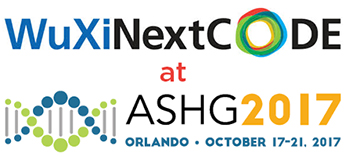
At the second WuXi NextCODE “Genomes for Breakfast” session at ASHG2017, Annerose Berndt, vice president of clinical genomics at University of Pittsburgh Medical Center, and Khalid Fakhro, director of genetics at Sidra Medical and Research Center in Qatar, outlined ambitious plans in large-scale genomics and precision medicine.
In my previous post, I described how Kari Stefansson started off this year’s ASHG breakfast session with a deep dive into deCODE’s toolbox and the powerful results the company has delivered.
Another of the renowned speakers at our “Genomes for Breakfast” session was Annerose Berndt, vice president of clinical genomics at UPMC (University of Pittsburgh Medical Center). She outlined UPMC’s ambitious plans in large-scale genomics and precision medicine. UPMC has a quite uniquely holistic role in underpinning the present and future healthcare of more than three million people in western Pennsylvania. It is an insurer, delivers healthcare through a rapidly growing network of dozens of hospitals, and conducts cutting-edge research in the life sciences and medicine, including through the University of Pittsburgh. It also has affiliated hospitals in nine countries apart from the U.S.
Last year, UPMC received one of the largest grants from the U.S. Precision Medicine Initiative and is investing in a large-scale genome sequencing effort that will both deliver patient care—through rare disease diagnostics and better-targeted cancer treatment—and create a major database for population-scale genomics research. Providing the integrated informatics, database, and tools for projects of such scale and combined clinical and research applications is what our platform does like no other, and we were very pleased to have UPMC present alongside and meet with our partners pursuing similar projects.
Closing out our population-focused breakfast we had the honor of hearing from our longtime collaborator Khalid Fakhro, director of genetics at our partner Sidra Medical and Research Center in Qatar. Sidra’s work, both on the Qatar Genome Programme and as the key maternity and pediatric hospital in Qatar, holds great promise for delivering higher-quality care to patients in Qatar and to advancing precision medicine around the world.
Echoing themes from Kari’s talk, Khalid outlined how Qatar’s population of 300,000, with its high consanguinity rates, is a fertile ground for identifying novel rare disease variants.
Leveraging data from 1,000 healthy Qataris and 600 families with rare disorders, Sidra has developed and published the first allelic map for any population in the Arab world. They are using WuXi NextCODE’s database and tools to drive forward with novel discoveries in a range of diseases, including congenital diarrhea and collagen disorders.
With the opening of Sidra’s hospital this year, and the integration of yet more data from the Qatar Genome Programme into our platform, Khalid emphasized that Qatar is well positioned to undertake not only a cutting-edge rare disease diagnostic testing program for pediatric patients but also drug target discovery. Much as deCODE has done with cardiovascular disease and numerous other conditions, the hope is to begin to analyze data for families and across the population in conditions such as type 2 diabetes. Such findings might well point to novel pathways that can be used to design treatments for those suffering from rare and common diseases alike.
I’ll also post soon about our second rare-disease focused breakfast session at ASHG: “Using NGS to diagnose rare disease—experiences from three continents.” Look for my next post about ASHG17.
